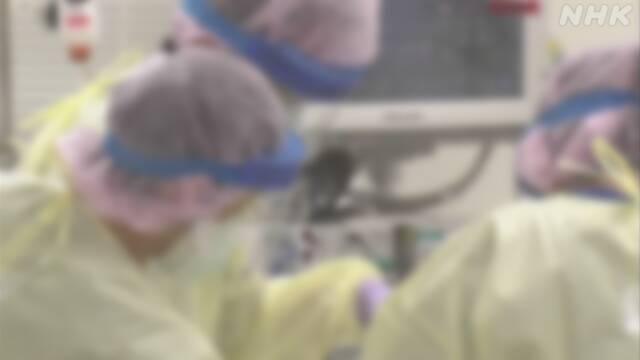Nearly 30% of healthcare workers for new corona patients are depressed 7:35 on July 7
When the Japanese Red Cross Medical Center investigated the effect of the new coronavirus on the mental health of medical staff, it was found that nearly 30% of them were depressed. The doctor who conducted the survey points out that "anxiety is increasing due to the characteristics of the virus that infects even if there are no symptoms. It is necessary to take measures to support the medical staff mentally."
The survey was conducted by the Japanese Red Cross Medical Center on all 2000 staff from April to May due to the spread of the infection.
In the survey, we asked them in a questionnaire about their feelings of depression, insomnia, and loss of appetite, and received 848 responses from doctors and nurses, as well as clerical staff.
As a result, it was found that 27.9%, or 237 people, were “depressed”.
The hospital accepted 218 people by the end of last month, including those suspected of being infected, and of these 76 cases were confirmed to be infected. Not only the teacher but also the staff such as the reception desk.
Dr. Yuzuru Izumo, who conducted a survey at the countermeasures headquarters, said that he may be infected with an unknown virus or unknowingly, and may infect patients, family members, colleagues, etc. It seems that the response, such as staying at a hotel by people, may have had an impact, and hospitals have created a team to provide mental care to respond.
Dr. Izumo said, “I was surprised more than I expected by people with a depressive tendency. While long-term war is expected, there are measures to support medical personnel mentally, such as providing care that does not keep them isolated and working shifts to refresh themselves. I need it."
Calling for the importance of strengthening measures in preparation for the long term
At the Japanese Red Cross Medical Center, in order to reduce the mental burden on staff, in April this year we launched a team supported by clinical psychologists and nurses, and have been taking measures.
Not only the doctors and nurses in the ward receiving patients, but the team that arranges supplies such as masks and medical gowns and the department in charge of reception work are all about once every two weeks. I go around to the department staff.
In addition to confirming that there are no problems or anxieties in the field, we also interview individual applicants to give specific advice on how to deal with stress.
Keiko Akiyama, a clinical psychologist who has been involved in this activity, said, “We are trying to convey the message that we are concerned about you and want to be helpful throughout the hospital. It is necessary to convey in words that there is a desire to protect."
On the other hand, he points out that the sense of burden is increasing due to the reduced communication between staff members and their families in order to prevent infections, and the prolonged response.
Regarding the staff's condition, he said, “There is a chronic feeling of fatigue throughout the hospital. Initially, I was anxious but eager to contribute, but as time went by, the goal of the marathon was postponed, it was a mess. I feel like I'm living in."
In addition, he said in the future that if chronic stress continues, the possibility of burning out may increase, which may cause more severe depressive symptoms, and stress the health care workers in case of longer-term response. We emphasize the importance of strengthening measures to alleviate.

